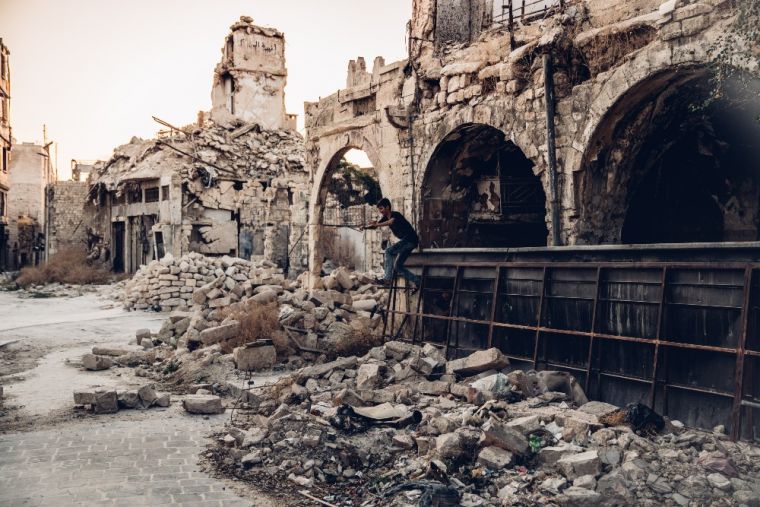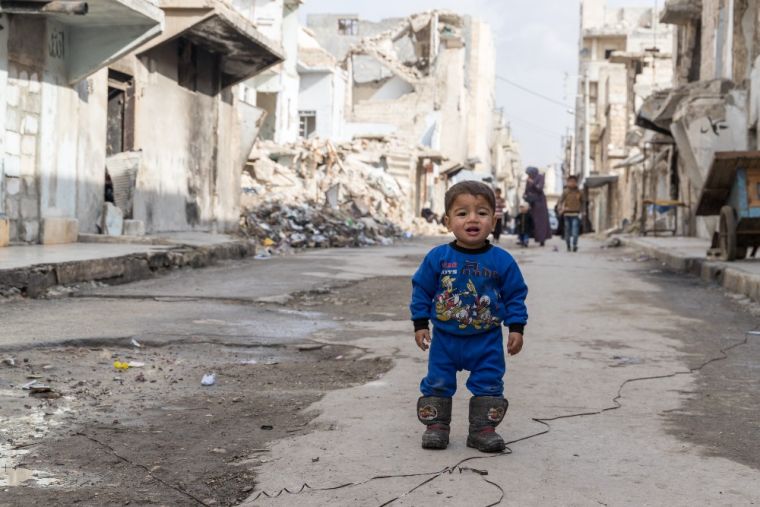Experiencing God in a war zone

Ibrahim Najjar, Open Doors' partner in Syria, speaks to Christian Today about life in the country after 10 years of civil war and why he's happy with his decision to stay in spite of all the difficulties and dangers.
CT: When the civil war first broke out in 2011, did anyone in Syria expect that it would go on for another 10 years?
Ibrahim: We all thought it would only be three to four weeks before there was a peaceful solution but as you know, that didn't happen.
CT: What has the emotional toll been like on the people of Syria?
Ibrahim: Aleppo was besieged for many months, and we ran out of food and water. The shelling could hit our streets and buildings from all angles, and start at any time in the morning or evening. Our church was targeted and our apartment building was also targeted, so we lived expecting that we might die at any point.
Living in such a situation of uncertainty is very hard because you have no idea what might happen tomorrow and you cannot dream for the future.
But on the other hand, the civil war has been a very simplifying force; we learned to simplify our lives. Before the war, for example, if a man wanted to get married, he needed to have a certain amount of money and a house. But now we do not think of such things because we learnt during the war that you might lose everything in a moment.
CT: Has the situation improved or are things as bad as ever after 10 years?
Ibrahim: At first, there was a lot of military conflict. Now we don't have many military battles in the city but the situation is worse than before because now we have the sanctions and an economic crisis. Before the crisis, you needed around $2,000 to become a millionaire. Now you are a millionaire with only $200, and salaries are only around $30 a month. So there are a lot of problems because we cannot eake out a living.
The situation is very hard now and many people are telling us they want to leave. Actually there are more people saying this now than during the conflict because they expected that when the fighting ended, things would get better but now we are inside another dark tunnel and so they feel like there is no escape at all.
CT: How hard has it been for the churches to give practical help?
Ibrahim: It's very hard and many of the people who were deeply involved in ministry have left the country. For example, in my city of Aleppo, before the war there were around 250,000 Christians and now there are only 30,000. At my church, none of the people who attended before the war are still here. All of them left the country.
But something that has been very reassuring and surprising is that although the number of Christians in the country has decreased, the churches are still working hard and many people are deeply involved in helping other people. God is blessing us here and there are many new believers in the churches.

CT: What keeps you going?
Ibrahim: You can keep going if you have a reason to stay, and I have found meaning in serving other people. Even though the number of people working in the churches now is decreasing, those who have stayed are more committed than ever to serving their community, because before the war, people couldn't see that they were making so much difference in society, but now we can see the huge difference we can make.
CT: Did you ever consider leaving?
Ibrahim: I was studying theology in Lebanon for a while and was actually invited to go and serve at an evangelical church in Canada but my wife and I were resolved to come back to Syria. Now I look at that decision and praise the Lord that I didn't leave the country because I can see how God is using me here.
I talk with people who left the country and are now living elsewhere, like in Europe, and they speak about having no meaning for their life.
I found my meaning, so I realized it's not about where you live and it's not about achievements, because God is not calling us to just 'achieve'. I believe He's calling us to make sacrifices and that the Kingdom of God is built upon our sacrifices.
Even though I know our children won't have the same opportunities in education here as they might have in the West, I believe we are doing something for the Kingdom of God, that God is blessing us, and that God will take care of my children as well.
CT: So staying is really an act of faith?
Ibrahim: Yes, this is very true. We can say all the right words but we don't always really mean them. But for me, I really mean what I am talking about. I am living that out.
CT: You mentioned new believers. Do you think people are coming to faith because of the trauma of war?
Ibrahim: Yes, and I think this is what happened throughout church history. It was during persecution and hard times that the church grew; people came to faith in such miserable situations.
I think people are searching for meaning and for the real God who will take care of them and give them a sense of satisfaction and belonging. I think before the crisis we were not really paying attention to God and spiritual things, but when you see death in front of your eyes and experience people dying, you start to think about your life and the meaning of your existence.
So people are asking these kinds of questions and God is using us to help them. Sometimes people have come to the church looking for some kind of practical support but found spiritual answers.
CT: Is ISIS still a threat?
Ibrahim: ISIS is gone in some places but they are still in some cities. And although they are not here in Aleppo anymore, there is now another Islamic fanatic militia. There are still many militias here so it's not a stable situation and we are always living in such a state of uncertainty. We don't know what might happen. Maybe they will invade us again.
CT: So many Christians have left Syria. Do you think there is any future for them in the country if they return?
Ibrahim: I'm very worried about the existence of Christians in Syria. We have been the salt and light of this country for hundreds of years and suddenly there are many villages that are now completely evacuated of Christians. They were in this village for 1,400 years but now, because of this war, they left.
I fear that in a few decades the country will be completely evacuated of Christians and this will affect not only the message of the Gospel but the country as a whole because the Christians have been a moderating force and even helped to foster reconciliation between the Sunnis and Alawites.
But the sanctions are a big barrier to people staying in the country and many people are now thinking of leaving because of the deteriorating economic situation. Sadly, the sanctions are not having an impact on the regime but on the ordinary people so it would be good if the global church could do something to help the Christians remain here. Otherwise they will leave and Syria will be left in a terrible situation.
CT: What would you like Christians in the UK to pray for?
Ibrahim: I believe that many people in the West have prayed for us Christians in Syria and we have seen the fruit. But it's very important to keep praying that the Christians here feel a sense of meaning for their lives and a sense of satisfaction. Pray that the Christians would not migrate anymore, and that the Church would continue to serve the people. Pray for the economic situation to get better and that God would work in the country's leaders and opposition to bring about a peaceful resolution to the conflict.











